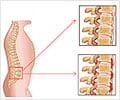A new study from Hospital for Special Surgery in New York has revealed that the use of anticoagulants to prevent blockage in pulmonary artery after joint replacement operations may actually lead to more deaths among patients taking these drugs.
Anticoagulants are routinely prescribed before and after total hip and knee replacement operations to reduce the risk of thrombosis, and death from pulmonary embolism in particular, as recommended by the Chest Physicians Consensus Statement.Lead researcher Dr. Nigel Sharrock along with his team has called for a revision of the American College of Chest Physicians' guidelines, in light of their review.
The researchers reviewed 20 studies including over 28,000 patients undergoing joint replacement surgery and who were prescribed medication to reduce the risk of thrombosis.
The patients were divided into three groups A, B and C. Patients in group A were given potent anticoagulants such as low molecular weight heparin while group B was given local spinal or epidural anesthesia, pneumatic compression and aspirin. Patients in group C were prescribed slow-acting oral anticoagulants such as warfarin.
They compared the total number of deaths and cases of non-fatal pulmonary embolism between three frequently used prevention protocols.
The researchers found that group B had lowest number of deaths. Patients in groups A and C were more than twice as likely to have died as those in group B.
Advertisement
Sharrock suggests that "the American College of Chest Physicians should reconsider their guidelines to reflect the fact that pulmonary embolism occurs despite the use of potent anticoagulants and may, in fact, expose patients to increased mortality after surgery."
Advertisement
Source-ANI
SPH/M











